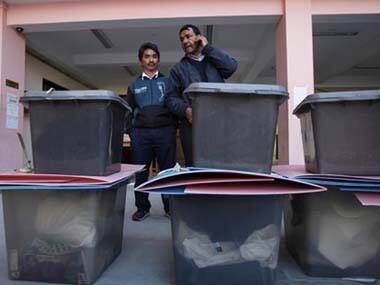Kathmandu: A bomb exploded outside a polling station in Nepal’s capital Tuesday, wounding three people, including an 8-year-old boy, as elections got underway aimed at ending years of political dysfunction.
Nepal is voting to elect a special assembly to draw up a long-delayed constitution, a step toward stability in a nation still reeling from a 10-year communist revolt and the overthrow of a centuries-old monarchy. Ram Dangol, an eyewitness, said the blast happened near a line of voters in Katmandu. [caption id=“attachment_1237953” align=“alignleft” width=“380”]  Nepal elections. AP[/caption] “People had lined up to vote at the polling station and there were children also playing nearby,” he said. “The boy picked something up and it exploded.” Opposition activists who do not recognize the country’s interim government have vowed to disrupt the polls, and at least 30 people have been wounded in small bomb blasts and other violence in the run-up to the election. An alliance of 33 opposition parties is boycotting the election. Candidates from more than 100 political parties are competing in the vote. The assembly will double as the parliament and choose a government. But analysts say none of the political parties is likely to get a majority, which could keep the country in a state of political paralysis. Already, residents face up to 14 hours of daily power cuts, Katmandu gets two hours of water every two or three days, and frequent fuel shortages force drivers to line up for a few liters of rationed gasoline and diesel. “We can only hope that the politicians will come to their senses and put the country’s interest before their own. We hope we have a stable government and politics,” said Ranju Singh, a university student who voted Tuesday. The last Constituent Assembly was elected in 2008, following the end of a 10-year Maoist insurgency and the overthrow of the monarchy. But the assembly was riven by infighting and never finished its work. The result is a power vacuum that has left the country without a proper constitution for nearly seven years. Some of the disagreements center on whether to divide the country into a federal system based on ethnic groups or strictly by geography. But the parties mostly squabble over who gets to lead the country. The United Communist Party of Nepal (Maoist), the party of former communist rebels, is hoping to repeat the last election and emerge as the largest party. Its main competitors are the Nepali Congress and Communist Party of Nepal (United Marxist Leninist). Nepal has 12 million registered voters. AP


)

)
)
)
)
)
)
)
)



